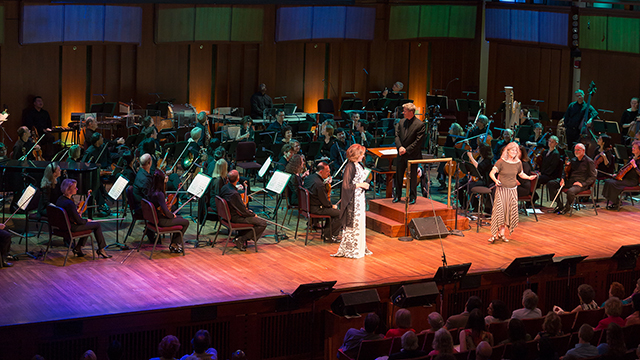EVANSTON - Northwestern University auditory neuroscientist Nina Kraus recently joined opera great Renée Fleming and National Institutes of Health Director Francis Collins on stage at the John F. Kennedy Center for the Performing Arts in Washington D.C. as part of a new initiative to explore the relationship between music and health.
Music and the Mind, sponsored in partnership by the NIH, the National Endowment for the Arts and the Kennedy Center, took place on June 2 and 3. This event was part conference and part music festival with a star-studded lineup, including singer-songwriter Ben Folds and Jazz virtuosos Vijay Iyer and Esperanza Spalding.
On Friday, June 2, Kraus, Hugh Knowles Professor in the School of Communication, talked about “why music moves us” with Fleming, who sang “Song to the Moon.” The following day, she presented on the topic of music and child development with help from four middle school students of the D.C. Youth Orchestra.
The performers shared the spotlight with leading scientists and medical doctors to explore what can be learned from studying music’s interaction with the brain, and what the potential implications might be for music therapy.
“It was a beautiful intersection between science and music,” said Kraus, who is the director of the Auditory Neuroscience Laboratory at Northwestern and an amateur musician.
“Public health can be informed by the impact of musical experience on the nervous system,” Kraus said. “We know music can be used to improve language development in children, offset aging and provide remediation of mild traumatic brain injury.
Kraus’ research explores the impact of aging, bilingualism, concussion and, of course, music on the brain. A 2014 study of Chicago Public Schools high school students found that two years of music education was associated with improved reading and brain responses to speech.
“My ‘Brainvolts’ Lab is working to develop physiological measures that use sound to track brain health,” Kraus said. “Such measures could become a uniform means to track the impact of musical experience on the nervous system and to track rehabilitation outcomes.”


